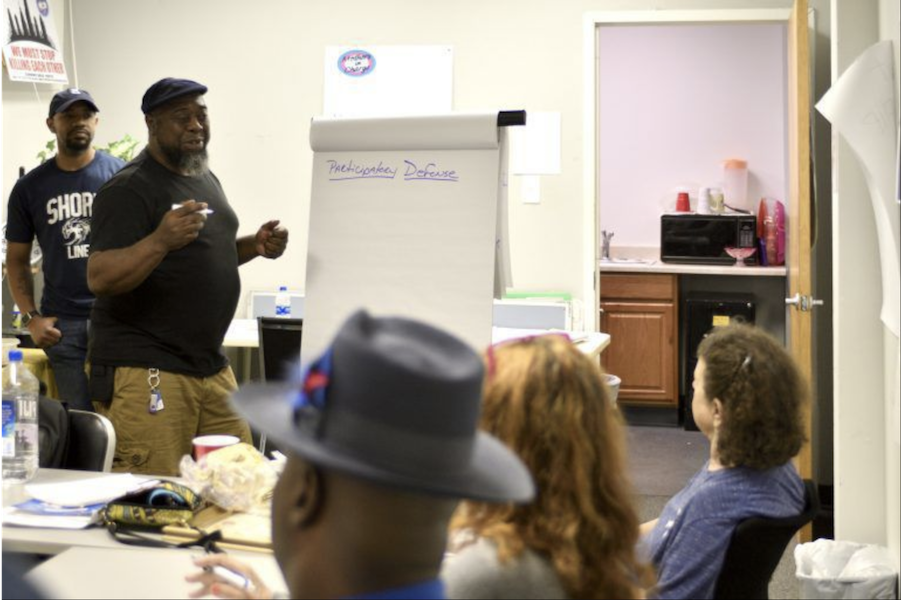[vc_row][vc_column width=”1/3″][/vc_column][vc_column width=”1/3″][dt_fancy_image image_id=”15404″ width=”200″][/vc_column][vc_column width=”1/3″][/vc_column][/vc_row][vc_row][vc_column width=”3/4″][/vc_column][vc_column width=”1/6″][vc_column_text]FOR IMMEDIATE RELEASE[/vc_column_text][/vc_column][/vc_row][vc_row][vc_column width=”1/6″ offset=”vc_col-lg-1 vc_col-md-1″][/vc_column][vc_column width=”5/6″][vc_column_text]For further information, contact:
Mandy Nace, 267-765-6319/215-806-0775
Special Committee on Criminal Justice Reform Highlights the Importance of Participatory Defense
PHILADELPHIA (Dec. 10, 2018) Philadelphia’s Special Committee for Criminal Justice Reform co-chair Keir Bradford-Grey, along with fellow co-chairs Councilman Curtis Jones and retired Philadelphia Police Commissioner Kevin Bethel, convened a hearing on participatory defense, a community-driven approach to criminal justice reform that brings families and communities together to create better outcomes and sustainable solutions.
“Participatory defense is transforming the landscape of power in the criminal justice system,” said Chief Defender Keir Bradford-Grey. “As we work with dynamic community organizers to establish participatory defense hubs across our city, we humanize the justice process and reduce our over-reliance on incarceration by helping individuals and their families at the pre-entry stage, or before trial. Right now, people are leaving our jails more desperate, having lost their housing, their benefits, and other supports. Community involvement through participatory defense can change that.
“I’m pleased that our city’s Special Committee on Criminal Justice Reform could provide an opportunity for the people who have made participatory defense a success here in our city to share their experiences. Today is just the start of a longer conversation about how we can expand participatory defense and change the way we approach criminal justice reform.”
Facilitators from Philadelphia’s first three community hubs testified about their work to support individuals, their families, and the larger community through participatory defense. Hub facilitators Steve Austin and Valerie Todd, along with volunteer Pastor Harrod Clay, represented the Mothers in Charge Best Outcomes Hub, which meets every Tuesday evening in center city. Bethany Stewart and Kris Eden discussed their work to establish the South Philadelphia Hub which meets every Monday evening at Circle of Hope Church. Akeem Sims and Nupur Shridhar shared stories about their work at the Kingsessing Hub, which meets every Thursday at the Kingsessing Recreation Center.
The transformative power of participatory defense was amplified by former hub client Nicole Dorrell and Zakiyyah Salahuddin, a South Philly mother who became an active supporter for participatory defense after the hubs supported her son through a difficult case that ended with the dismissal of all charges.
“I can’t begin to explain how much this support means to me,” said Salahuddin. “At every step of the way, our lawyers and community supporters were right there with us. It’s hard to put into words how much that has helped us.”
Assistant Defender Isis Misdary described the power of participatory defense to influence the justice process. “As an attorney who referred several of my own cases to the participatory defense hubs, I can tell you that communities want a say in how their communities can be safer. The system dismantles and disrupts not only families, but also the communities in which individuals and their families live. By removing the person from her family, her community, we remove an opportunity for the community to intervene with a member of their own to heal and move forward.
“Participatory Defense unites communities and stakeholders in a collaborative pursuit of justice. We are changing how communities and stakeholders work together, and we’re transforming not only individual cases, but also, through individual cases, transforming the system itself and by extension, our communities.”
The Defender Association is an independent, nonprofit organization that provides high-quality, client-centered legal representation, connection to social services, and re-entry support to adults and juveniles in Philadelphia. Our organization represents more than 60 percent of adults and juveniles arrested in the City of Philadelphia. [/vc_column_text][/vc_column][vc_column width=”1/6″ offset=”vc_col-lg-1 vc_col-md-1″][/vc_column][/vc_row]









